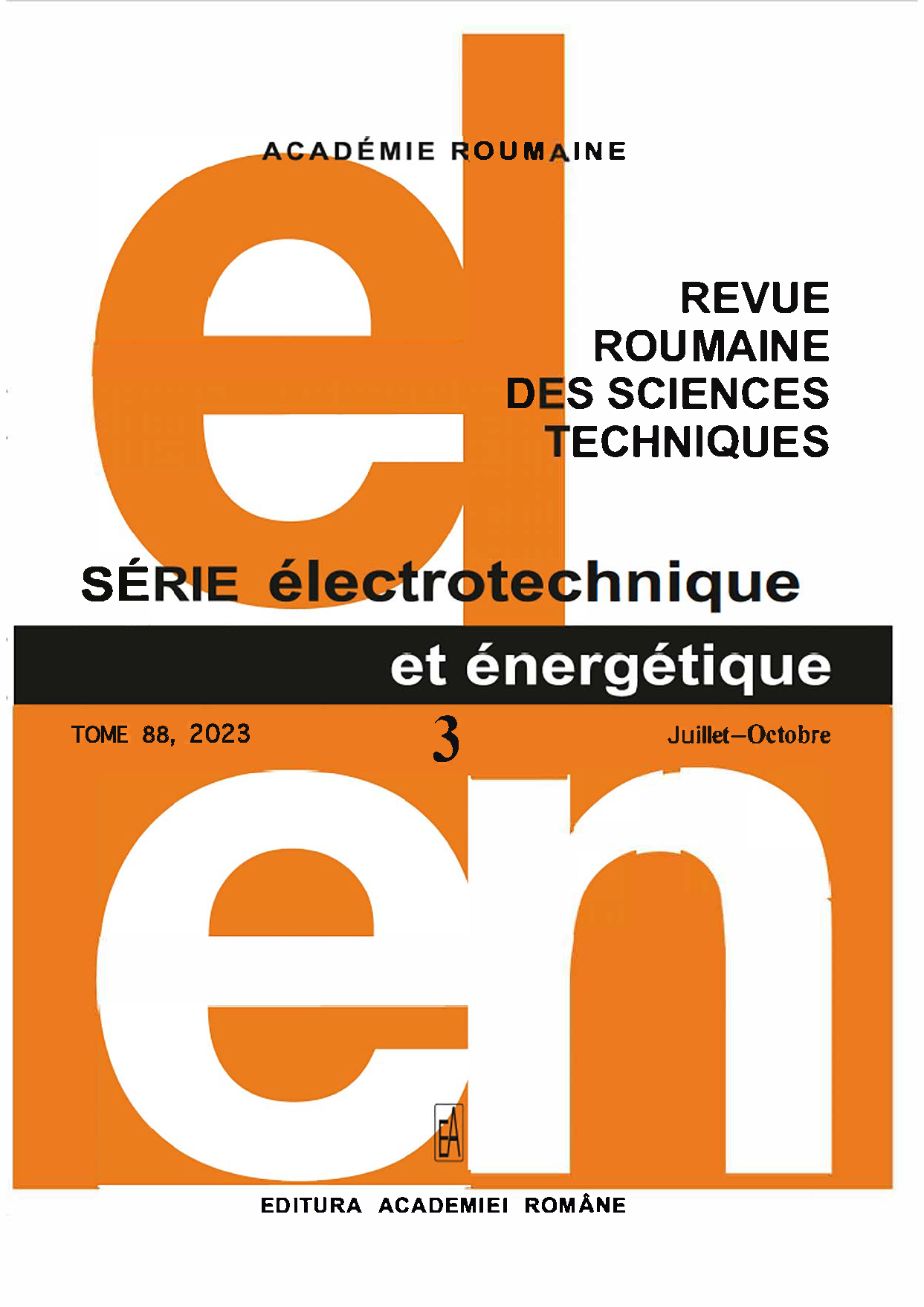ANALYZING A THREE HUNDRED TEETH BI-PHASE HYBRID STEPPER MOTOR WITH DIFFERENT NUMBERS OF POLE PAIRS
DOI:
https://doi.org/10.59277/RRST-EE.2023.3.6Keywords:
Hybrid stepper motor, Finite Element Method (FEM), Holding torque, Detent torqueAbstract
The paper presents numerical models of a bi-phase, 0.3° full step hybrid stepper motor (HSM), with 16, 24, 32, 40, and, respectively, 48 poles in the stator. For the motor to move with a constant step angle, the stator and the rotor teeth must be shifted against each other with an angle of zero, 90, 180, and 270 electric degrees for each four consecutive stator poles. Due to this, bi-phase steppers with the number of poles in the stator different than eight are hardly seen. Therefore, to allow the construction of HSMs with different numbers of poles, some of the stator poles must be shifted from their symmetrical position. The five topologies' HSM detent and holding torque characteristics and their geometrical and constructive differences are presented. The Finite Element Method (FEM) based models are developed using the professional software COMSOL Multiphysics.
References
(1) P. Li, H. Lu, J.V.V. Athani, Stepper Motors: Fundamentals, Applications and Design, New Age International (1997).
(2) C. Stuebig, B. Ponick, Comparison of calculation methods for hybrid stepping motors, in IEEE Transactions on Industry Applications, 48, 6, pp. 2182–2189 (Nov.-Dec. 2012).
(3) M. Onsal, Y. Demir, M. Aydin, M.K. Guven, Impact of airgap on the performance of 3-phase permanent magnet hybrid stepper motor, IECON 2021 – 47th Annual Conference of the IEEE Industrial Electronics Society, Toronto, ON, Canada, pp. 1–5 (2021).
(4) Ki-Bong Jang, Seong-Yeop Lim, Tae-Bin Lim, Chang-Sung Jin, Yun-Hyeon Cho, Young-Tae Kim, and Ju Lee, Member, IEEE, 2-D FE analysis of hybrid stepping motor using a virtual magnetic barrier, IEEE Transactions on Magnetics, 39, 5 (2003).
(5) E.C.T. So, S.J. Yang, The effect of tooth shape on radial forces in step motors, IEEE Transactions on Magnetics, 29, 6, pp. 2413–2415, (1993).
(6) R.P. Praveen, M.H. Ravichandran, V.T.S. Achari, V.P. Jagathy Raj, G. Madhu, G.R. Bindu, Design and finite element analysis of hybrid stepper motor for spacecraft applications, IEEE International Electric Machines and Drives Conference, pp. 1051–1057 (2009).
(7) I. Ionică, M. Modreanu, A. Morega, C. Boboc, Design and modeling of a hybrid stepper motor, 2017 10th International Symposium on (Advanced Topics in Electrical Engineering (ATEE), Bucharest, Romania, pp. 192–195 (2017).
(8) I. Ionică, M. Modreanu, A. Morega, C. Boboc, Numerical analysis of a hybrid stepper motor for the electromagnetic torque calculation, 2019 11th International Symposium on Advanced Topics in Electrical Engineering (ATEE), Bucharest (2019).
(9) O. Craiu, T.I. Ichim, L. M. Melcescu, L. Popescu, Optimization of a High Torque Density Small Hybrid Stepper using 3D FEM Model, 2022 International Symposium on Power Electronics, Electrical Drives, Automation and Motion (SPEEDAM), pp. 610–615 (2022).
(10) I. Ionică, M. Modreanu, A. Morega, C. Boboc, Geometry Influence on the Electromagnetic Torque Calculation of a Stepper Motor, 2021 12th International Symposium on Advanced Topics in Electrical Engineering (ATEE), pp. 1–7 (2021).
(11) K.R. Rajagopal, B. Sing, B.P. Singh, Optimal tooth-geometry for specific performance requirements of a hybrid stepper motor, in IEEE Transactions on Magnetics, 39, 5, pp. 3010–3012, Sept. 2003.
(12) ***AC/DC Module User’s Guide©, 1998–2020, COMSOL Multiphysics, Version: COMSOL 5.6.
(13) O. Craiu, T.-I. Ichim, L.C. Popescu, 3D fem model of a hybrid stepper using scalar-vector potential formulations, 2023 13th International Symposium on Advanced Topics in Electrical Engineering (ATEE), Bucharest, Romania, pp. 1–5 (2023).
(14) A. Arkkio, Analysis of Induction Motors Based on the Numerical Solution of the Magnetic Field and Circuit Equations, PhD Thesis, Helsinki (1987).
(15) P. Li, H. Lu, J. Shen, Analysis method of dynamic torque-frequency characteristic of hybrid stepping motors, 2017 Twelfth International Conference on Ecological Vehicles and Renewable Energies (EVER), pp. 1–6 (2017).
(16) K.R. Rajagopal, M. Krishnaswamy, B. Sing, B.P. Singh, An improved high-resolution hybrid stepper motor for solar-array drive of Indian remote-sensing satellite, in IEEE Transactions on Industry Applications, 33, 4, pp. 906–913 (1997).
(17) *** https://www.nema.org/standards/view/motors-and-generators
(18) M. Bjekić, A, Milovanovic, B. Koprivica Prediction of pull-in and pull-out torque characteristics of the permanent magnet step motor, Rev. Roum. Sci. Techn. – Électrotechn. Et Énerg.,60, 1, pp. 29–38 (2015).
Downloads
Published
Issue
Section
License
Copyright (c) 2023 REVUE ROUMAINE DES SCIENCES TECHNIQUES — SÉRIE ÉLECTROTECHNIQUE ET ÉNERGÉTIQUE

This work is licensed under a Creative Commons Attribution-NonCommercial-NoDerivatives 4.0 International License.


